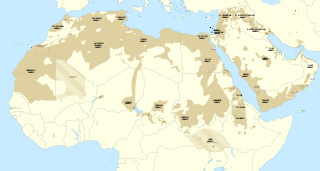Related Research Articles

The Semitic languages are a branch of the Afroasiatic language family. They include Arabic, Amharic, Tigrinya, Aramaic, Hebrew, Maltese and numerous other ancient and modern languages. They are spoken by more than 330 million people across much of West Asia, North Africa, the Horn of Africa, Malta, and in large immigrant and expatriate communities in North America, Europe, and Australasia. The terminology was first used in the 1780s by members of the Göttingen school of history, who derived the name from Shem, one of the three sons of Noah in the Book of Genesis.
Baruch is a masculine name among Jews used from Biblical times to the present, which is sometimes used as surname. It is also found, though more rarely, among Christians—particularly among Protestants who use Old Testament names.
Baraka or Barakah may refer to:

Aziz is a Semitic name from the root two-zayin. In the Hebrew Bible, the root two-zayin means 'reputable, powerful, sublime'. In the 1 Chronicles, Aziz was the son of Shema and the father of Bela. Azizus (Latinised), attested as an Arabian king who ruled Sampsigeramids of the Roman Empire.
The roots of verbs and most nouns in the Semitic languages are characterized as a sequence of consonants or "radicals". Such abstract consonantal roots are used in the formation of actual words by adding the vowels and non-root consonants which go with a particular morphological category around the root consonants, in an appropriate way, generally following specific patterns. It is a peculiarity of Semitic linguistics that a large majority of these consonantal roots are triliterals.
Barak was a military general in the Book of Judges in the Bible.
The proper name Arab or Arabian has been used to translate several different but similar-sounding words in ancient and classical texts which do not necessarily have the same meaning or origin. The etymology of the term is closely linked to that of the place name Arabia.
BRQ may refer to:
Shin-Lamedh-Mem is a triconsonantal root of many Semitic words. The root meaning translates to "whole, safe, intact, unharmed, to go free, without blemish". Its earliest known form is in the name of Shalim, the ancient god of dusk of Ugarit. Derived from this are meanings of "to be safe, secure, at peace", hence "well-being, health" and passively "to be secured, pacified, submitted".
Barracks are buildings built to house military personnel or laborers.
Barakat is an Arabic word meaning blessings. It may refer to:
Mubarak is an Arabic given name. A variant form is Baraka or Barack, analogous to the Hebrew verb "barakh" בָרַךּ, meaning "to kneel, bless", and derived from the concept of kneeling in prayer. The Arabic prefix m- is a passive participle prefix, meaning "who or which is blessed" (baraka). Mubarak is thus the Arabic equivalent of the Latinate name "Benedict".
Hosni Mubarak (1928–2020) was an Egyptian military and political leader who was President of Egypt from 1981 to 2011.
K-B-D is a triliteral Semitic root with the common meaning of to "be heavy", and thence "be important; honour, majesty, glory".
Barack Obama is an American attorney who served as President of the United States from 2009 to 2017.
Benedict is a masculine given name of Latin origin, meaning "blessed". Etymologically, it is derived from the Latin words bene ('good') and dicere ('speak'), i.e. "well spoken". The name was borne by Saint Benedict of Nursia (480–547), often called the founder of Western Christian monasticism.
Saher is either a feminine given name of Arabic origin, common throughout the Persian-speaking and Muslim worlds, or unisex given name of Hebrew origin, used mainly in Israel. Though the Arabic and Hebrew names are phonologically identical and both derive from Semitic languages, they are nonetheless etymologically unrelated. In Arabic, the name means "just before dawn", coming from a common Semitic root meaning "dawn". The origin of the Hebrew name is an ancient Akkadian word for the crescent moon.
Barak is a masculine name of Hebrew origin. It appears in the biblical Book of Judges as the name of the Israelite general Barak, who alongside Deborah led an attack against the forces of King Jabin of Hazor.
Derived stems are a morphological feature of verbs common to the Semitic languages. These derived verb stems are sometimes called augmentations or forms of the verb, or are identified by their Hebrew name binyan, and sometimes correspond with additional semantic meaning such as passive or causative action.
Barrak or Al-Barrak is a surname. Notable people with the surname include: